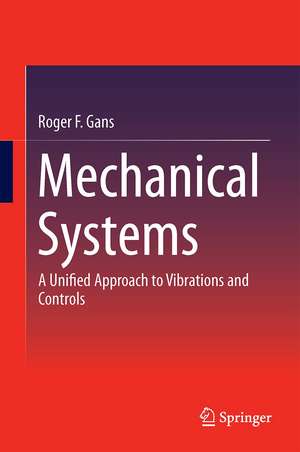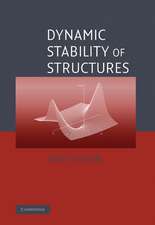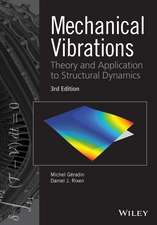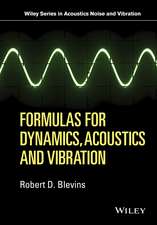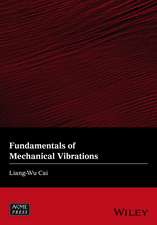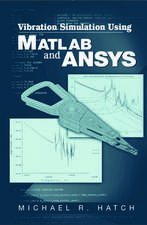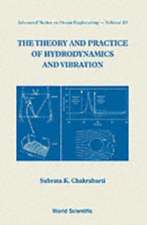Mechanical Systems: A Unified Approach to Vibrations and Controls
Autor Roger F. Gansen Limba Engleză Hardback – 17 sep 2014
| Toate formatele și edițiile | Preț | Express |
|---|---|---|
| Paperback (1) | 386.48 lei 38-44 zile | |
| Springer International Publishing – 24 sep 2016 | 386.48 lei 38-44 zile | |
| Hardback (1) | 520.20 lei 6-8 săpt. | |
| Springer International Publishing – 17 sep 2014 | 520.20 lei 6-8 săpt. |
Preț: 520.20 lei
Preț vechi: 612.00 lei
-15% Nou
Puncte Express: 780
Preț estimativ în valută:
99.54€ • 104.21$ • 82.36£
99.54€ • 104.21$ • 82.36£
Carte tipărită la comandă
Livrare economică 05-19 aprilie
Preluare comenzi: 021 569.72.76
Specificații
ISBN-13: 9783319083704
ISBN-10: 3319083708
Pagini: 437
Ilustrații: XVI, 437 p. 62 illus., 38 illus. in color.
Dimensiuni: 155 x 235 x 25 mm
Greutate: 1 kg
Ediția:2015
Editura: Springer International Publishing
Colecția Springer
Locul publicării:Cham, Switzerland
ISBN-10: 3319083708
Pagini: 437
Ilustrații: XVI, 437 p. 62 illus., 38 illus. in color.
Dimensiuni: 155 x 235 x 25 mm
Greutate: 1 kg
Ediția:2015
Editura: Springer International Publishing
Colecția Springer
Locul publicării:Cham, Switzerland
Public țintă
Upper undergraduateCuprins
Overview with Some Definitions and Mathematics.- One Degree of Freedom Systems.- More Than One Degree of Freedom Systems and the Euler-Lagrange Process.- Modal Analysis.- Vibration Measurement.- State Space, Equilibrium, Linearization, and Stability.- Classical Control.- The Basics of State Space Control.- Observers.- Tracking Control.- Introduction to Nonlinear Control.
Notă biografică
Dr. Roger Gans is Professor Emeritus of Mechanical Engineering at the University of Rochester
Textul de pe ultima copertă
This essential textbook covers analysis and control of engineering mechanisms, which include almost any apparatus with moving parts used in daily life, from musical instruments to robots. The text presents both vibrations and controls with considerable breadth and depth using a unified notation. It strikes a nice balance between the analytical and the practical. This text contains enough material for a two semester sequence, but it can also be used in a single semester course combining the two topics. Mechanical Systems: A Unified Approach to Vibrations and Controls presents a common notation and approach to these closely related areas. Examples from the both vibrations and controls components are integrated throughout this text.
This book also:
· Presents a unified approach to vibrations and controls, including an excellent diagram that simultaneously discusses embedding classical vibrations (mechanical systems) in a discussion of models, inverse models, and open and closed loop control
· Makes a careful connection of the Lagrangian approach and state space
· Introduces the reader to a formal approach to linearization, something that every engineering student should know, but which is not included in many programs or undergraduate textbooks
· Discusses simulation of nonlinear systems for comparison with and evaluation of the usual linear approximations
· Features a concise discussion of DC motors, affording a more realistic approach to controls using voltage inputs instead of disembodied forces and torques
· Includes a final chapter that addresses feedback linearization generally and in the context of robots with purely revolute joints
This book also:
· Presents a unified approach to vibrations and controls, including an excellent diagram that simultaneously discusses embedding classical vibrations (mechanical systems) in a discussion of models, inverse models, and open and closed loop control
· Makes a careful connection of the Lagrangian approach and state space
· Introduces the reader to a formal approach to linearization, something that every engineering student should know, but which is not included in many programs or undergraduate textbooks
· Discusses simulation of nonlinear systems for comparison with and evaluation of the usual linear approximations
· Features a concise discussion of DC motors, affording a more realistic approach to controls using voltage inputs instead of disembodied forces and torques
· Includes a final chapter that addresses feedback linearization generally and in the context of robots with purely revolute joints
Caracteristici
Presents a unified approach to vibrations and controls, including an excellent diagram that simultaneously discusses embedding classical vibrations (mechanical systems) in a discussion of models, inverse models and open and closed loop control Makes a careful connection of the Lagrangian approach and state space Introduces the reader to a formal approach to linearization, something that every engineering student should know, but which is not included in many programs or undergraduate textbooks Emphasizes Includes simulations of nonlinear systems compared with the usual linear approximations Features a concise discussion of DC motors, affording a more realistic approach to controls Includes a final chapter address feedback linearization generally, and in the context of robots with purely revolute joints Includes supplementary material: sn.pub/extras
